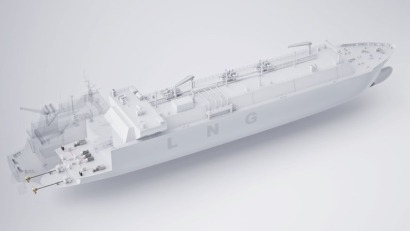
DNV’s Maritime Advisory assessment concludes that the DFE+ concept is “a competitive and more energy efficient alternative to even the most efficient conventional dual-fuel LNG carrier propulsion designs.”
Smaller machinery space requirements could deliver “a conservative estimate” of 5% greater cargo capacity. Combined with other steps to optimize performance, the DFE+ concept could contribute to overall energy savings of 6 – 7.5% considering the ship’s increased transport work, DNV says.
From January 1, 2023 the International Maritime Organization (IMO) has required shipowners to report vessels into an Energy Efficiency Design Index (EEDI), an Energy Efficiency Existing Ships Index (EEXI) and an operational Carbon Intensity Index (CII). These tools benchmark ships so that owners know what they must do to meet IMO targets for reducing greenhouse gas emissions.
As the newest addition to MAN’s four-stroke portfolio, the MAN 49/60DF engine is optimized for LNG. It is also highly compatible with ABB’s Dynamic AC system, which combines the merits of conventional AC with those of variable frequency to allow the engines to operate on optimal speeds – significantly improving total fuel consumption.
"Owners of LNG carriers face specific challenges in complying with the regulations, given their reliance on propulsion solutions with limited potential for efficiency gains," said Prof. George Dimopoulos, Scientific Advisor, DNV.
"The ABB – MAN propulsion concept aims to offer a highly effective way for LNG carriers to meet progressively tightening emissions regulations while also reducing fuel costs."
DFE+ could be installed with an energy storage solution to operate as a spinning reserve, or come coupled with ABB’s Azipod® electric propulsion. ABB and MAN will also explore integrating fuel cells as the technology matures.

